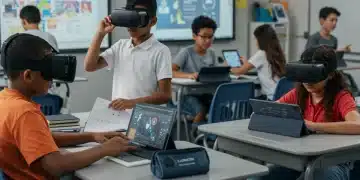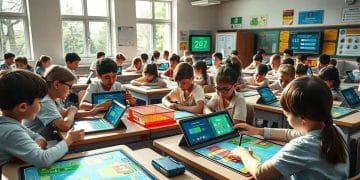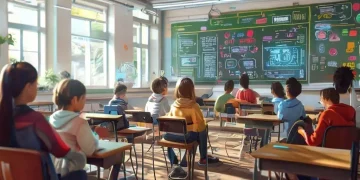Remote learning platforms trends shaping education today

Remote learning platforms trends are transforming education by integrating advanced technologies, personalizing experiences, and promoting flexible learning models to enhance student engagement and collaboration.
Remote learning platforms trends are revolutionizing education, making it more accessible and engaging. Have you noticed how virtual classrooms have changed your learning experience? Let’s dive into the latest trends.
Emerging technologies in remote learning
Emerging technologies are greatly enhancing the effectiveness of remote learning. These advancements are making education more interactive, engaging, and accessible for students, regardless of their location.
Interactive Learning Tools
One of the most exciting developments is the rise of interactive learning tools. These platforms allow students to engage actively with the material, making learning more effective.
Examples include:
- Virtual classrooms that host real-time discussions
- Gamified learning experiences that motivate students
- Collaborative software for group projects
- Simulation software for hands-on training in various fields
Such tools are designed to make learning fun and impactful. Educators are now able to utilize these technologies to personalize learning experiences, catering to the unique needs of each student.
Artificial Intelligence in Education
Artificial intelligence is another groundbreaking technology transforming remote learning. AI can analyze student performance and provide tailored feedback, helping them improve their skills efficiently.
For instance, AI-driven applications can suggest personalized resources and study plans based on individual learning patterns. This means that students can learn at their own pace while receiving support tailored to their specific requirements. Additionally, chatbots are enhancing communication between students and educators, facilitating instant answers to common questions.
Moreover, these technologies ensure that learning is not just limited to traditional methods. Students can access a wealth of information and resources, enriching their educational experience.
As we progress, the integration of these technologies into everyday schooling practices will likely expand. This evolution marks a significant step towards more engaging and effective learning environments.
Benefits of hybrid learning models

Hybrid learning models combine traditional classroom experiences with online education. This approach has numerous benefits that appeal to students, teachers, and educational institutions.
Flexibility in Learning
One of the standout advantages of hybrid learning is its flexibility. Students can learn at their own pace, choosing when and where to engage with the material. This opens up opportunities for different learning styles, allowing each student to adapt the experience to their needs.
For example, students can revisit recorded lessons or complete assignments online when it fits into their schedule. This adaptability leads to increased student satisfaction and motivation.
Enhanced Engagement
Hybrid learning also promotes enhanced engagement among students. By integrating technology, it fosters interactive learning experiences that can make lessons more dynamic. Teachers can use various tools like videos, quizzes, and virtual discussions to capture student interest.
This can lead to better retention of information, as students are more likely to engage with content that resonates with them.
- Utilizing multimedia resources attracts diverse learners.
- Interactive platforms encourage collaboration between peers.
- Virtual discussions allow for in-depth analysis of topics.
As a result, classrooms become vibrant spaces where students actively participate rather than passively receiving information.
Moreover, the hybrid model prepares students for real-world situations by equipping them with digital skills. In a world where technology is ever-present, being comfortable with both online and offline resources is crucial for future success.
Additionally, hybrid learning environments can alleviate some of the challenges that come with entirely remote education. Students can benefit from the social interactions that occur in physical classrooms while still enjoying the conveniences that online learning provides. Therefore, this balance creates a well-rounded educational experience.
Strategies for effective online collaboration
Effective online collaboration is essential for successful remote learning. As students and teachers work together in virtual environments, certain strategies can enhance teamwork and communication.
Utilizing Collaboration Tools
One key strategy is to utilize a variety of collaboration tools. These tools help students connect and work together easily, regardless of their physical location.
Popular options include:
- Video conferencing platforms for real-time discussions.
- Shared digital workspaces for group projects.
- Instant messaging apps for quick communication.
- Project management tools to track progress.
These resources provide a seamless way for students to collaborate and share ideas.
Setting Clear Goals
Setting clear goals for group work is another important aspect of effective online collaboration. Students should understand their roles and what they need to accomplish together. Clearly defined objectives help maintain focus during group activities.
For example, students can agree on specific tasks, deadlines, and responsibilities, ensuring everyone is on the same page. This not only enhances productivity but also promotes accountability among group members.
Moreover, establishing norms for communication is essential. Students can discuss how often they should meet, the methods for sharing feedback, and how to support each other. This structured approach fosters a positive learning atmosphere.
Encouraging active participation is also vital for successful collaboration. In a remote setting, some students may feel shy or hesitant to share their ideas. Creating an inclusive environment where everyone feels valued will encourage them to contribute freely.
Additionally, regular check-ins are helpful to keep groups engaged and motivated. These touchpoints provide opportunities for students to share progress and address any challenges they may face.
Future predictions for remote education

Future predictions for remote education suggest a landscape that is increasingly flexible and technology-driven. As educational institutions adapt to the changing needs of students, we can expect several key trends to emerge.
Integration of Advanced Technologies
First, the integration of advanced technologies such as virtual reality (VR) and augmented reality (AR) will reshape how students learn. These immersive tools will offer realistic environments where students can engage with the material more deeply.
For example, students might explore historical sites through VR or conduct science experiments in a virtual lab setting. This hands-on experience enhances understanding and retention.
Personalized Learning Experiences
The future of remote education will also see personalized learning experiences become the norm. With the help of artificial intelligence (AI), educational platforms will analyze individual learning styles and adapt content accordingly.
This means that students can work at their own pace, focusing on areas where they need more practice while advancing in subjects they excel in. Such customization will lead to better educational outcomes and greater student satisfaction.
Furthermore, the role of educators will evolve. Teachers will act as facilitators, guiding students through tailored learning paths rather than delivering one-size-fits-all lectures.
- Diverse assessments and feedback mechanisms will track student progress.
- Students will engage in collaborative projects with peers worldwide.
- Educational resources will become more accessible through mobile technology.
As these advancements take place, the importance of soft skills like communication and teamwork will take center stage. With remote learning experiences becoming mainstream, students will need to interact and collaborate with peers in virtual settings, preparing them for the workplace of the future.
Moreover, schools may adopt hybrid models that allow students to alternate between in-person and online learning. This flexibility not only accommodates various learning preferences but also prepares students for a future that is likely to blend the digital and physical worlds.
remote education is bright and filled with possibilities. As we continue to integrate advanced technologies and personalize learning experiences, students will enjoy a more flexible, engaging, and tailored education. Teachers will play a crucial role in guiding students through this new landscape. By embracing these changes, we can create an education system that meets the needs of every learner, preparing them for success in a rapidly changing world. The blending of in-person and online learning will not only enhance knowledge but also cultivate vital skills needed for the future workforce.
FAQ – Frequently Asked Questions about Remote Education
What are the benefits of hybrid learning models?
Hybrid learning models offer flexibility, enhanced engagement, and personalized learning experiences, allowing students to learn at their own pace.
How will technology change remote education in the future?
Advanced technologies like virtual reality and artificial intelligence will create more immersive and tailored educational experiences.
What skills will students need for future remote learning environments?
Students will need strong communication and collaboration skills to effectively work in online group settings.
What role will teachers play in remote education going forward?
Teachers will transition into facilitators, guiding students through personalized learning paths and helping them adapt to new technologies.





